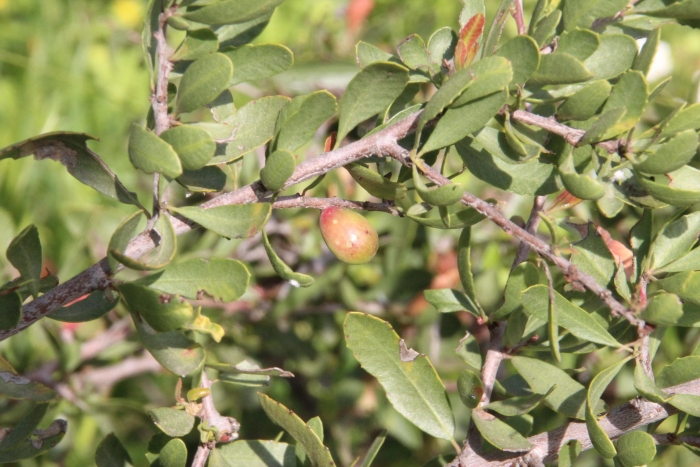Hardee Peppertree
(Schinus polygama)
Hardee Peppertree (Schinus polygama)
/
/

Tony Rebelo
CC BY-SA 4.0
Image By:
Tony Rebelo
Recorded By:
Copyright:
CC BY-SA 4.0
Copyright Notice:
Photo by: Tony Rebelo | License Type: CC BY-SA 4.0 | License URL: http://creativecommons.org/licenses/by-sa/4.0/ | Rights Holder: Tony Rebelo | Publisher: iNaturalist | Date Created: 41921 |





















Estimated Native Range
Summary
Schinus polygama, commonly known as Hardee peppertree or Chilean pepper tree, is a dioecious evergreen tree or large shrub native to the dry Andean foothills and Monte Desert regions of Argentina and Chile. It has also naturalized in parts of California. This species typically grows to a height of 15-20 feet (4.5-6 meters) with an equal spread, and features a rounded, dense canopy. The Hardee peppertree is characterized by its narrow, leathery leaves and clusters of small, white flowers that bloom in spring. The flowers are followed by red berries that are attractive to birds. The bark is rough and becomes deeply fissured with age.
The Hardee peppertree is valued for its drought tolerance and is often used in xeriscaping, urban planting, and as a windbreak or privacy screen in arid and semi-arid regions. It thrives in full sun and requires well-drained soils, tolerating a range of soil types from sandy to loamy. While it is relatively low-maintenance, it can become weedy and invasive outside its native range, so caution is advised when planting. It is also susceptible to Texas root rot and other fungal diseases in poorly drained soils.CC BY-SA 4.0
The Hardee peppertree is valued for its drought tolerance and is often used in xeriscaping, urban planting, and as a windbreak or privacy screen in arid and semi-arid regions. It thrives in full sun and requires well-drained soils, tolerating a range of soil types from sandy to loamy. While it is relatively low-maintenance, it can become weedy and invasive outside its native range, so caution is advised when planting. It is also susceptible to Texas root rot and other fungal diseases in poorly drained soils.CC BY-SA 4.0
Plant Description
- Plant Type: Tree
- Height: 10-30 feet
- Width: 10-20 feet
- Growth Rate: Moderate
- Flower Color: White
- Flowering Season: Summer
- Leaf Retention: Evergreen
Growth Requirements
- Sun: Full Sun
- Water: Low
- Drainage: Medium, Fast
Common Uses
Bee Garden, Bird Garden, Drought Tolerant, Low Maintenance
Natural Habitat
Native to the dry Andean foothills and Monte Desert regions of Argentina and Chile
Other Names
Common Names: Chilean Peppertree, Peppercorn Tree, Huingán, Cypress Peppertree
Scientific Names: , Schinus polygama, Amyris dioica, Amyris polygama, Duvaua crenata, Duvaua cuneata, Duvaua cuneata, Duvaua dentata, Duvaua dependens, Duvaua dependens var. obovata
GBIF Accepted Name: